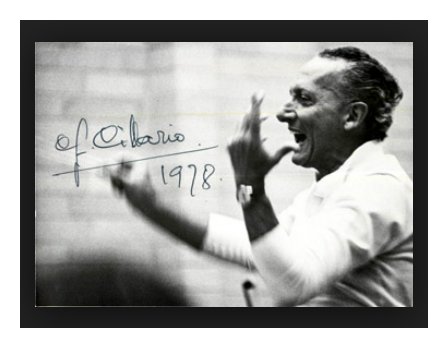

| Carlo Felice Cillario (7 February
1915 – 13 December 2007) was an Argentinian-born Italian conductor of international
renown. Born Carlos Felix Cillario in San Rafael, Mendoza, Argentina, he went to Italy in 1923, where he studied the violin and composition at the Bologna Conservatorio. He hoped to become a soloist but a wrist injury playing soccer made him turn to conducting. He made his conducting debut in 1942 in Odessa. During the war, he returned to Argentina, where he conducted the Symphonic Orchestra of the University of Tucuman. Upon his return to Italy, he founded the Bologna Chamber Orchestra in 1946, and reserved a major portion of his time to opera, conducting at the opera houses of Rome, Turin, Florence, Milan, etc. He quickly began appearing outside Italy, notably in Athens, Berlin, Oslo and Paris. The year 1961 saw his debuts in England, at the Glyndebourne Festival in L'elisir d'amore, and in the United States, at the Lyric Opera of Chicago in La Forza del Destino, later conducting The Barber of Seville, La Cenerentola, La favorita and La bohème. In 1964, he made his debut at the Royal Opera House in London at the request of Maria Callas, conducting her now famous series of Tosca performances with Tito Gobbi. Debuts at the San Francisco Opera followed in 1970 (Tosca) and at the Metropolitan Opera in New York in 1972 (La sonnambula). He became one of the favorite conductors of Montserrat Caballé, conducting at her Covent Garden debut in 1972 (La traviata with Nicolai Gedda and Victor Braun), in a London concert performance of Caterina Cornaro, and shortly after in an RCA studio recording of Norma. Carlo began conducting seasonally in Australia in 1968, working with the Australian Opera (now Opera Australia) at the Sydney Opera House, becoming principal guest conductor in 1988, before retiring in 2003; leaving behind a legacy of musicianship and phrasing evident in his surviving music scores at the Opera Australia library. Carlo Felice Cilliaro stands as one of the most singer-friendly of all conductors, a reassuring and solid presence both in the opera house and in the recording studio. He died in 2007, in Bologna, Italy. -- Throughout this page, names which are links
refer to my interviews elsewhere on this website. BD
|
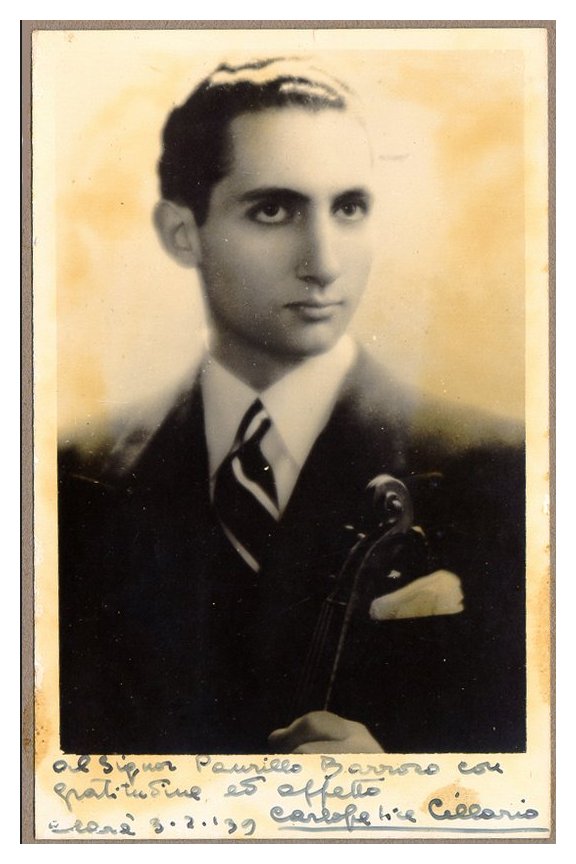 CFC: There were many changes in productions and
new operas. One change was in the public. Forty years ago, when
I was a student, I was a violinist, a fiddler [shown in photo at left], and I did many,
many concerts with virtuosos for many years. That is the reason that
I started during the War. I remember that for us musicians, opera
was not interesting very much, because we considered it was an old art.
CFC: There were many changes in productions and
new operas. One change was in the public. Forty years ago, when
I was a student, I was a violinist, a fiddler [shown in photo at left], and I did many,
many concerts with virtuosos for many years. That is the reason that
I started during the War. I remember that for us musicians, opera
was not interesting very much, because we considered it was an old art.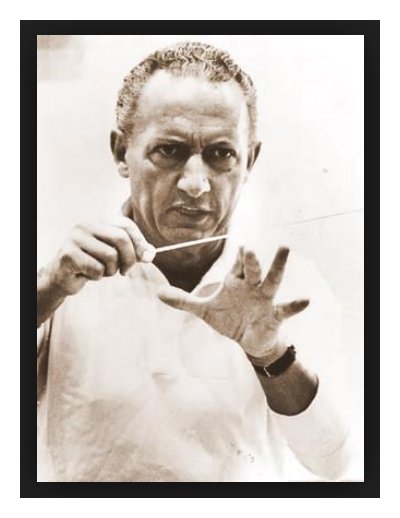 CFC: I think so. It could, and I know that
Karajan has already introduced some good things on television. Often
television is just taken from a live performance, but I think it must be
something made special for television, not in the bad way we do often.
We just put a camera in front of the singer, and you see all the dentist’s
work in the mouth of the stars. That is not interesting at all.
But if it is planned for television, it can work. If you have the singers
two yards from the public, that is very, very good because the public will
be much more impressed. For example, I will tell you something that
my daughter did. She’s a biologist, so she not just interested in music.
She plays guitar and a little flute, and one day I was in Naples conducting
an opera and I attended with her a performance of Otello. We were in the big, huge,
Teatro San Carlo in Naples and the wonderful cast included Mario del Monaco.
I saw that during the first act my daughter was absent; was not involved
within the opera. At the end of the first act I asked her if she was
interested and she said she was bored! I told her I liked her sincerity!
During the intermission I took her into the dressing room, and then to the
wings of the stage for the second act. She was then just a few yards
from the production of the sound and from the acting of the singers, and
she was completely involved! Often it’s the distances that kill the
interest of the public.
CFC: I think so. It could, and I know that
Karajan has already introduced some good things on television. Often
television is just taken from a live performance, but I think it must be
something made special for television, not in the bad way we do often.
We just put a camera in front of the singer, and you see all the dentist’s
work in the mouth of the stars. That is not interesting at all.
But if it is planned for television, it can work. If you have the singers
two yards from the public, that is very, very good because the public will
be much more impressed. For example, I will tell you something that
my daughter did. She’s a biologist, so she not just interested in music.
She plays guitar and a little flute, and one day I was in Naples conducting
an opera and I attended with her a performance of Otello. We were in the big, huge,
Teatro San Carlo in Naples and the wonderful cast included Mario del Monaco.
I saw that during the first act my daughter was absent; was not involved
within the opera. At the end of the first act I asked her if she was
interested and she said she was bored! I told her I liked her sincerity!
During the intermission I took her into the dressing room, and then to the
wings of the stage for the second act. She was then just a few yards
from the production of the sound and from the acting of the singers, and
she was completely involved! Often it’s the distances that kill the
interest of the public.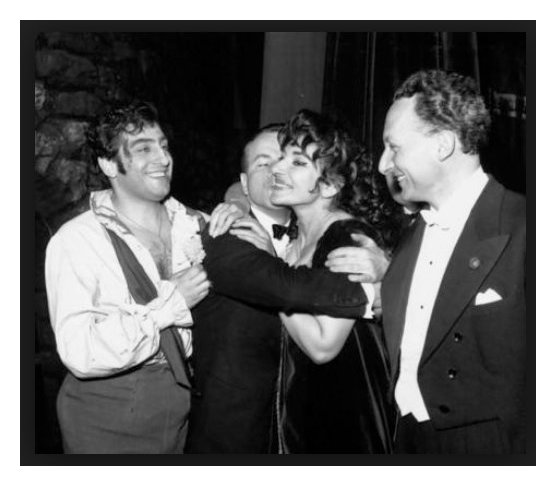 CFC: I didn’t believe that, but a lot of them
the following day told me, “You were very concentrated yesterday during
my singing!” [Both laugh] The music is not high quality, of
course. [Sighs a bit, then moves on to the more general topic]
In any case, now I see that the youth have a great enthusiasm for opera.
I had the pleasure to conduct Callas in Covent Garden for several performances
of Tosca in a Zeffirelli production
many years ago, and people were sleeping three nights and two days in the
freezing November weather...
CFC: I didn’t believe that, but a lot of them
the following day told me, “You were very concentrated yesterday during
my singing!” [Both laugh] The music is not high quality, of
course. [Sighs a bit, then moves on to the more general topic]
In any case, now I see that the youth have a great enthusiasm for opera.
I had the pleasure to conduct Callas in Covent Garden for several performances
of Tosca in a Zeffirelli production
many years ago, and people were sleeping three nights and two days in the
freezing November weather...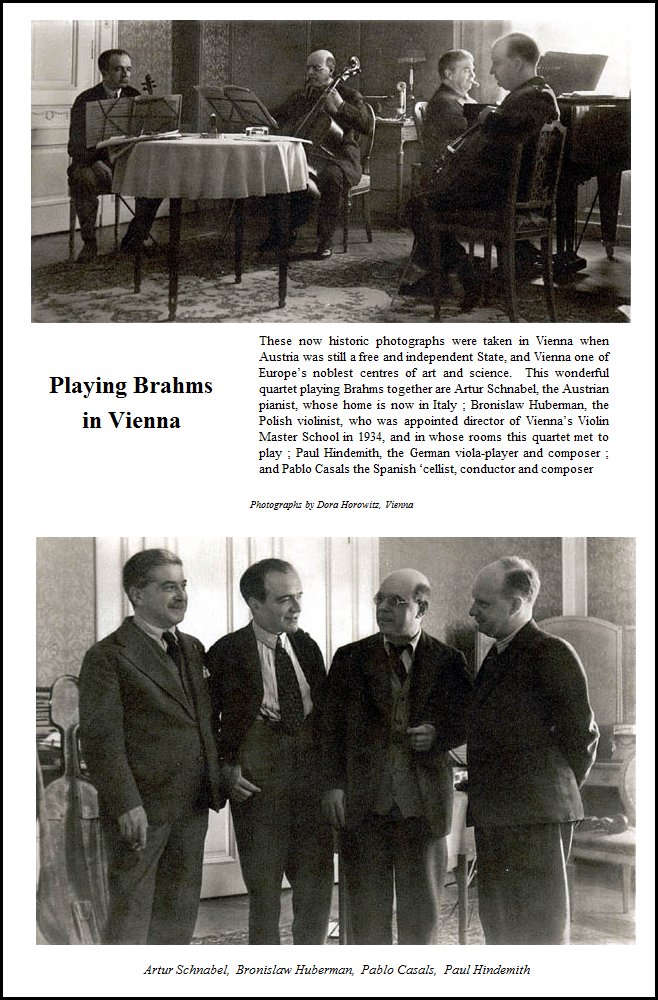 CFC: Of course. Every artist is in touch
with his public. Don’t forget that I was a virtuoso violin player, so
I always had the public in front of me. I remember something that is
very funny from a man that was not a great humorist, but he said something
funny one time. It was Bronisław Huberman (1882-1947), the greatest
violinist in my opinion, a Polish man. I was so lucky that I had the
occasion to hear him a few times to play Beethoven especially, and Brahms
and Bach Chaconnes. In my
opinion, Pablo Casals (1876-1973) and Bronisław Huberman were the top players.
Anyway, because he had crossed-eyes, with one looking to the left and the
other looking right, he liked to do a joke. He said, “A
beautiful woman can inspire an artist, and I am a lucky man because during
my playing I can look at one beautiful lady in the top gallery and another
on the main floor and get inspiration from two ladies!”
[Both laugh]
CFC: Of course. Every artist is in touch
with his public. Don’t forget that I was a virtuoso violin player, so
I always had the public in front of me. I remember something that is
very funny from a man that was not a great humorist, but he said something
funny one time. It was Bronisław Huberman (1882-1947), the greatest
violinist in my opinion, a Polish man. I was so lucky that I had the
occasion to hear him a few times to play Beethoven especially, and Brahms
and Bach Chaconnes. In my
opinion, Pablo Casals (1876-1973) and Bronisław Huberman were the top players.
Anyway, because he had crossed-eyes, with one looking to the left and the
other looking right, he liked to do a joke. He said, “A
beautiful woman can inspire an artist, and I am a lucky man because during
my playing I can look at one beautiful lady in the top gallery and another
on the main floor and get inspiration from two ladies!”
[Both laugh]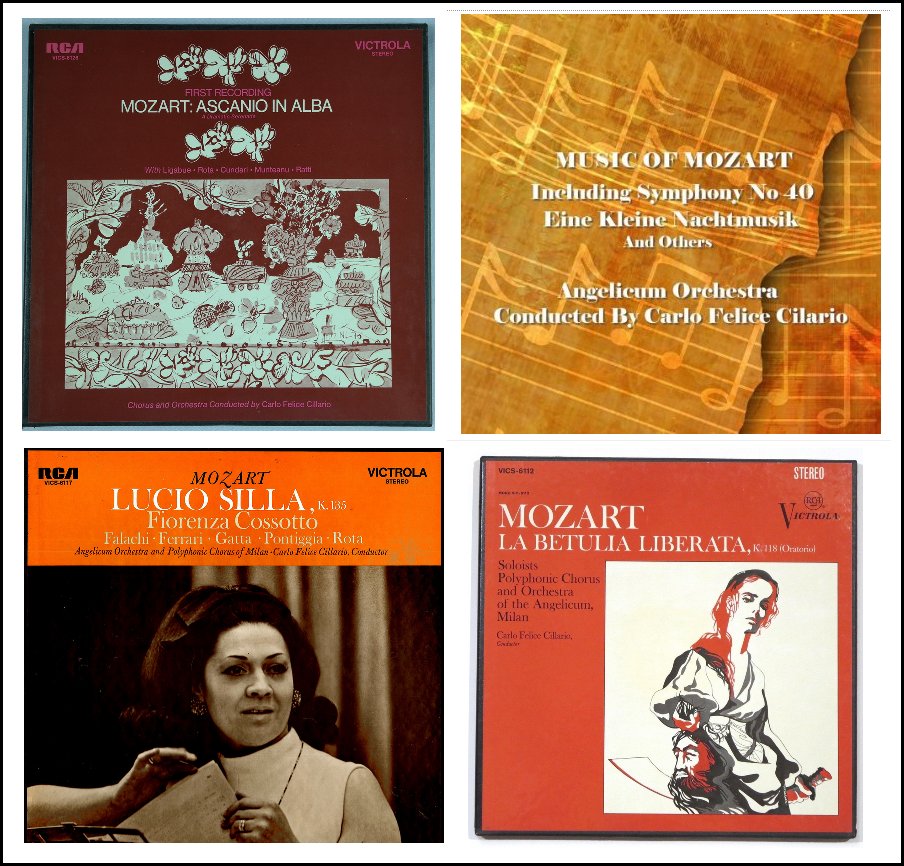
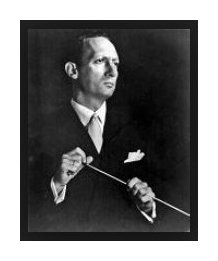 BD: How do you end Don Giovanni? Do you
end it with him going down to hell, or do you include the epilogue?
BD: How do you end Don Giovanni? Do you
end it with him going down to hell, or do you include the epilogue?Carlo Felice Cillario at Lyric Opera of Chicago
1961 - La Forza del Destino with Farrell, Bergonzi, Guelfi, Christoff,
Cesari, Ludwig
Barber of Seville with Simionato, Bruscantini, Alva, Corena, Christoff 1962 - La Bohème with Rubio/Sighele, Tucker, Zanasi, Moynagh, Wildermann/Christoff, Cesari, Corena Tosca with Crespin, Zampieri, Gobbi, Cesari, Corena L'elisir d'amore with Adani, Kraus, Zanasi, Corena 1963 - Barber of Seville with Berganza, Zanasi, Kraus, Corena, Christoff Don Pasquale with Adani, Kraus, Bruscantini, Corena 1964 - La Favorita with Cossotto, Kraus, Bruscantini, Vinco La Cenerentola with Berganza, Casellato, Bruscantini, Tadeo, Cesari 1965 - La Bohème with Freni, Corelli, Bruscantini, Ariè, Martelli, Cesari, Tadeo Madama Butterfly with Scotto, Cioni, Bruscantini, Casei, de Palma Aïda with Price/Lee, Lamberti, Cossotto, Bastianini/Colzani, Vinco 1982 - La voix humaine with Barstow; and Pagliacci with Barstow, Vickers, MacNeil, Carlson, Gordon |
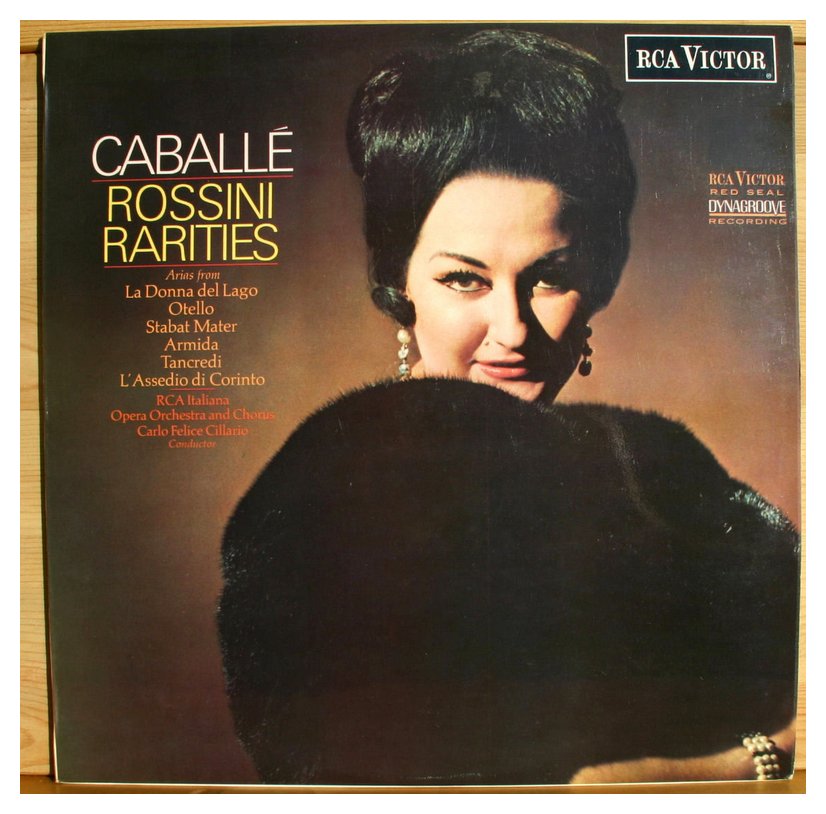
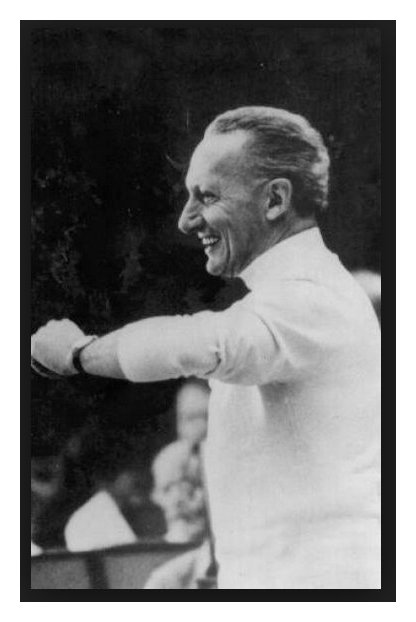 CFC: Oh yes, I am positively sure of that.
If we don’t destroy all the public and we continue to have good voices,
operas will be always very interesting for the crowd. For example,
in Sydney they have a new opera house and they have a big public for opera,
so much so that they must repeat so many times during the summer.
Remember, opera has all the Mozart repertoire, all the Wagner repertoire,
all the Verdi repertoire plus Richard Strauss plus Fidelio. It is my favorite.
It is my masterpiece, plus the Stravinsky opera is a very high standard
also.
CFC: Oh yes, I am positively sure of that.
If we don’t destroy all the public and we continue to have good voices,
operas will be always very interesting for the crowd. For example,
in Sydney they have a new opera house and they have a big public for opera,
so much so that they must repeat so many times during the summer.
Remember, opera has all the Mozart repertoire, all the Wagner repertoire,
all the Verdi repertoire plus Richard Strauss plus Fidelio. It is my favorite.
It is my masterpiece, plus the Stravinsky opera is a very high standard
also.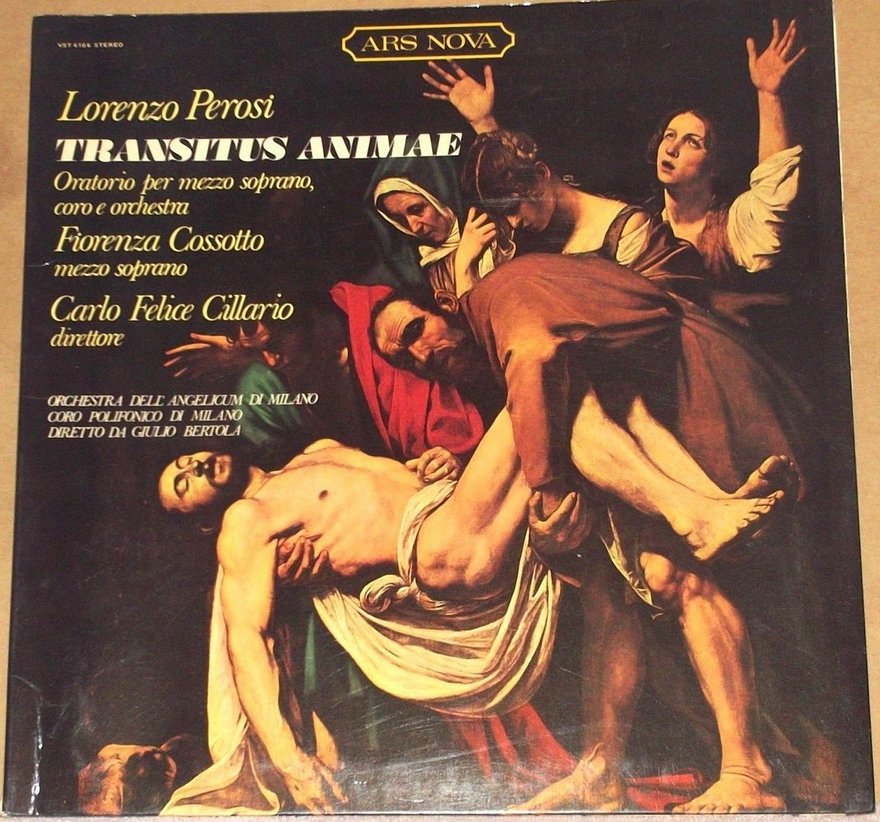
Monsignor Lorenzo Perosi (21 December
1872 – 12 October 1956) was an Italian composer of sacred music and the
only member of the Giovane Scuola who did not write opera. In the late 1890s,
while he was still only in his 20s, Perosi was an internationally celebrated
composer of sacred music, especially large-scale oratorios. Nobel Prize winner
Romain Rolland wrote: "It's not easy to give you an exact idea of how popular
Lorenzo Perosi is in his native country." Perosi's fame was not restricted
to Europe. A 19 March 1899 New York Times article entitled "The Genius of
Don Perosi" began: "The great and ever-increasing success which has greeted
the four new oratorios of Don Lorenzo Perosi has placed this young priest-composer
on a pedestal of fame which can only be compared with that which has been
accorded of late years to the idolized Pietro Mascagni by his fellow-countrymen."
Gianandrea Gavazzeni made the same comparison: "The sudden clamors of applause,
at the end of the [19th] century, were just like those a decade earlier
for Mascagni." Perosi worked for five Popes, including Pope St. Pius X who
greatly fostered his rise.
According to biographer Graziella Merlatti, Perosi was the most prolific composer of sacred music of the 20th century. According to musicologist Arturo Sacchetti's estimate, Perosi composed 3,000-4,000 works. A great many still await publication; some have not yet been located. Despite the relative obscurity of his name today, Perosi was a prominent member of the Giovane Scuola, of which the most important Verismo composers or Veristi (Puccini, Mascagni, Leoncavallo, Giordano, and Cilea) were all considered members. An entire chapter is dedicated to Perosi in Romain Rolland's Musiciens d’Aujourd’hui (1899). Perosi was deeply admired not only by Rolland and by the above-named Veristi, but also by Boito, Toscanini, and many others. Caruso sang his music, as did Sammarco, Tagliabue, Gigli, and other great singers from that era, and also quite a few in modern times, such as Fiorenza Cossotto, Mirella Freni, Renato Capecchi, and fellow Tortonese Giuseppe Campora. His French admirers included Debussy, Massenet, Guilmant and d'Indy. |
This conversation was recorded in Chicago on November 8, 1982. Portions were broadcast on WNIB 1986, 1990, 1995, and 2000. This transcription was made in 2015, and posted on this website at that time. My thanks to British soprano Una Barry for her help in preparing this website presentation.
To see a full list (with links) of interviews which have been transcribed and posted on this website, click here.
Award - winning broadcaster Bruce Duffie was with WNIB, Classical 97 in Chicago from 1975 until its final moment as a classical station in February of 2001. His interviews have also appeared in various magazines and journals since 1980, and he now continues his broadcast series on WNUR-FM, as well as on Contemporary Classical Internet Radio.
You are invited to visit his website for more information about his work, including selected transcripts of other interviews, plus a full list of his guests. He would also like to call your attention to the photos and information about his grandfather, who was a pioneer in the automotive field more than a century ago. You may also send him E-Mail with comments, questions and suggestions.